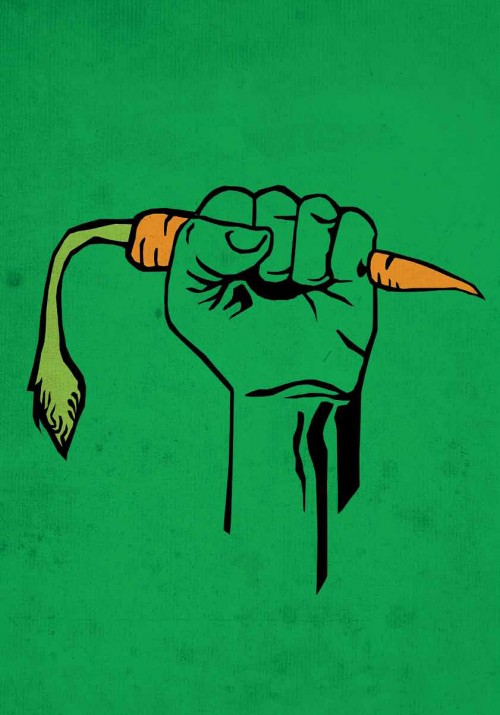 Will Etling’s “Sustain,” originally for GOOD magazine and contributed to Green Patriot Posters.I’ve been watching the protests on Wall Street for the past few weeks with some interest. I’m all for speaking out and, on occasion, for putting your feet to the pavement and taking to the streets in peaceful demonstration. There is more than a little to demonstrate about today on Wall Street and in Washington.
Will Etling’s “Sustain,” originally for GOOD magazine and contributed to Green Patriot Posters.I’ve been watching the protests on Wall Street for the past few weeks with some interest. I’m all for speaking out and, on occasion, for putting your feet to the pavement and taking to the streets in peaceful demonstration. There is more than a little to demonstrate about today on Wall Street and in Washington.
But when it comes to anger, scapegoating, and class-warfare-baiting, I say: Put a fork in it. No, better: Put your hands in it. Put your hands in the soil — literally and metaphorically: the dirt from whence your dinner comes, and the soil of the economy, as in the small, local businesses that are vital to the economy.
How do we do this? We take some of our money out of ever-more-complex and volatile global financial markets and put it to work in things that we understand and that contribute to our communities.
If we get over a little of our fear and frustration and look around our hometowns, we will find plenty of entrepreneurial opportunities to begin fixing our economy and our civil society, from the ground up.
I’m talking about the prospect of a million Americans taking 1 percent of their money and investing in small food enterprises, near where they live.
I’m not proposing this because local food is the next trend after organic, or the next stop for Prius drivers who’ve just joined their local CSA. This is not just about a libertarian impulse to take our food supply back from corporations that seem eager to fill our food with GMOs and to empty our Main Streets of small food enterprises.
This is about rolling up our sleeves and doing something that at first seems inconsequential and risky, but soon seems rewarding and impactful — and about as conservative as conservative can get. I’m talking about investing with your friends and neighbors in small organic farms, grain mills, creameries, small slaughterhouses, seed companies, compost companies, restaurants that source locally, butchers and bakers and, sure, a bee’s-wax candlemaker or two. Take 1 percent of your money out of the stock market and put it into food hubs, community kitchens, community markets, school gardens, niche organic brands, makers of sustainable agricultural inputs, and more.
I’ll see your derivatives and raise you a grass-fed beef company. I’ll see your few thousand Masters of the Universe and raise you 1.9 million earthworms (the number found in an acre of fertile soil on Thompson Family Farm in Boone County, Iowa).
Protest is good. Protest is necessary. But even more necessary is a new way of investing that reflects the structural problems of the economy and the realities of the 21st century.
Let’s fix our economy and our culture from the ground up — starting with food.
Slow Money’s third National Gathering comes to San Francisco, Oct. 12-14.


